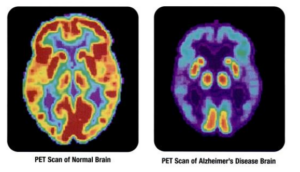 Alzheimer’s disease is a progressive and degenerative disorder that affects brain cells, or neurons, in ways that result in loss of memory, compromised intellectual and physical functioning, and changes in mood and behavior. The most common type of dementia, Alzheimer’s disease (AD) is not a normal part of the aging process. According to the Alzheimer’s Foundation of America, it is estimated that over 5 million people in the United States suffer with AD and that one to four family members serve as caregivers for each individual with the disease. Through research a great deal of information has been learned about AD including signs and symptoms in each stage of the disorder, how it affects brain cells, and the development of medications that can slow the progression of the disorder. To date AD is an incurable disease that is treated through symptom management and medications that may retard advancement of neuronal damage.
Alzheimer’s disease is a progressive and degenerative disorder that affects brain cells, or neurons, in ways that result in loss of memory, compromised intellectual and physical functioning, and changes in mood and behavior. The most common type of dementia, Alzheimer’s disease (AD) is not a normal part of the aging process. According to the Alzheimer’s Foundation of America, it is estimated that over 5 million people in the United States suffer with AD and that one to four family members serve as caregivers for each individual with the disease. Through research a great deal of information has been learned about AD including signs and symptoms in each stage of the disorder, how it affects brain cells, and the development of medications that can slow the progression of the disorder. To date AD is an incurable disease that is treated through symptom management and medications that may retard advancement of neuronal damage.
In addition to symptom management in the patient, it is critical that caregivers, who suffer along with their loved one, attend to their needs and well-being. The following recommendations may assist caregivers in taking care of themselves.
- Anticipate feeling a myriad of emotions-often simultaneously. It is common to experience feelings of great sadness while feeling anger toward your loved one.
- Talk with others when feeling guilt. Feelings of guilt can impede judgment and decision-making. Talk with trusted others about your feelings of guilt.
- Recognize and accept physical and emotional limitations. The demands of caregiving are taxing. Let go of perfectionism in your responsibilities as caregiver.
- Seek support. Get involved in support groups for caregivers and give yourself the gift of psychotherapy. Acknowledge feelings of loss and grief.
- Make time for enjoyable activities. At least once per week, do something that is physically or emotionally nurturing.
- Research reliable websites such as the Alzheimer’s Foundation of America.
Resource:
www.alzfdn.org/AboutAlzheimers/statistics_pr.html

By: Lee Bach, PhD, Program Director, MA & PsyD Programs